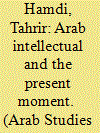|
|
|
Sort Order |
|
|
|
Items / Page
|
|
|
|
|
|
|
| Srl | Item |
| 1 |
ID:
164743


|
|
|
|
|
| Summary/Abstract |
The Iraqi poet Saadi Youssef urgently asks, “Why are the poets silent?/Where have they gone?” These questions underscore the compelling need for the guiding voices of Arab intellectuals at this deeply divided present moment in the Arab world that has effectively seen the destruction of seemingly stable nations and identities. It is important to understand why and how easily “things fell apart” for Arab nations and peoples under the destructive influence and direct intervention of imperialist and Zionist agendas and forces. What does it mean to speak truth to power in the current Arab and global context where the destruction of Arab nations, such as Iraq, Syria, Libya, and Yemen has become the all too familiar, convenient, and accepted status quo, which is marked by destructive and exclusionary discourses? It has become incumbent upon the Arab intellectual/writer/poet to lead the self-examination process in order to provide an understanding of the current Arab situation within its greater global context and construct a revolutionary and insurrectionary oppositional discourse that would expose and dismantle the current defeatist and divisionary discourses. Antonio Gramsci's concepts of hegemony and consent, Louis Althusser's ideological state apparatuses, and Edward Said's important ideas on the intellectual's critical consciousness, secular criticism, and beginnings are the theoretical lenses used to help decipher the catastrophic happenings in the Arab world. This study also examines excerpts of literary works by important Arab poets/intellectuals, such as Mahmoud Darwish, Mourid Barghouti, Bader Shaker Al-Sayyab, Saadi Youssef, and Yusuf Al-Ani.
|
|
|
|
|
|
|
|
|
|
|
|
|
|
|
|
| 2 |
ID:
170483


|
|
|
|
|
| Summary/Abstract |
The Reluctant Fundamentalist proves vitally engaged in the concerns of the mind and its passages reveal a struggle with difficulties of a sort that make anxiety seem an innocuous euphemism or outdated scholarly endeavor, which inevitably veers the reader's attention away from their importance in understanding the text and its world. This essay is concerned with the psychological, artistic, historical and geographical contingencies Mohsin Hamid faces in putting together his novel/la1 through the travail of production and publication. The Reluctant Fundamentalist has cemented Hamid's reputation and taken on the guise of a relatively autonomous sphere in its own fashion. Hamid resorts to powerful actions of a “begetting” kind, and specifying points of departure for his novel/la grows increasingly problematic. The novel/la is in fact intricate, and its resemblance with many productions is striking nevertheless. Going against the grain of fundamental and dominant traditions through a reluctant ethos, Hamid engages in beginnings and beginnings again to find alternatives, a Saidian reasoning read in The Reluctant Fundamentalist. Taking its cue from Hamid's reflection on the manufacturing of his own “fiction” and Said's Beginnings, this essay examines how Hamid builds on Albert Camus's La chute as a point of reference to inaugurate The Reluctant Fundamentalist which owes its genesis to miscellaneous acts of beginning based, among many others, on McEwan's Atonement and Ali's Brick Lane. Hamid also engages world events such as America's beginning as a nation and 9/11, which both have inspired the novel/la's impulse to begin and begin again in the process of production. These influences with the alternatives given make up the texture of his novel/la, which is not only creative in nature, but also theoretical and philosophical in trajectories.
|
|
|
|
|
|
|
|
|
|
|
|
|
|
|
|
|
|
|
|
|